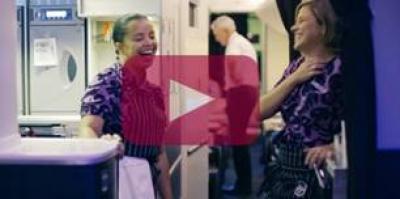Air New Zealand, its catering partner LSG Sky Chefs and the Ministry for Primary Industries (MPI) have teamed up to tackle inflight waste from Air New Zealand’s international services arriving in Auckland with a world-leading partnership expected to divert 150 tonnes of waste from landfill annually. The waste reduction initiative Project Green has enabled 40 Air New Zealand inflight products that were previously sent to landfill due to biosecurity controls, to be reclassified so they can be reused on future flights if removed from aircraft sealed and untouched. Products approved to date include sealed beverages and unopened snacks with further items to be added in coming months. In the first month of running Project Green across its international fleet, the airline diverted 13 tonnes of waste, including 266,000 plastic cups, 480kg of sugar packets and 3.5 tonnes of bottled water. The programme, which has been developed over 18 months, is also enabling greater recycling of low biosecurity risk packaging, more accurate loading of catering items onto aircraft and reduced waste disposal costs with fewer items sent to landfill. Waste management is a significant issue for all airlines, with International Air Transport Association (IATA) data estimating the global industry generated 5.2m tonnes of inflight waste in 2016. While Air New Zealand has always been waste-conscious, quarantine controls have presented challenges to recycling initiatives in the past. Air New Zealand Head of Operational Delivery Alan Gaskin says, “We’ve spent considerable time auditing our inflight waste to gain a better understanding of how we can improve our handling processes. By collaborating with LSG Sky Chefs and MPI we’ve been able to make significant gains and we’re incredibly encouraged by the early data we’re seeing. “Project Green is an outstanding example how airlines can work with border regulators to develop solutions to reduce cabin waste without comprising quarantine controls.” The project has required a change in onboard processes for the airline’s staff, particularly for cabin crew who play a key role by returning unused items to stowage and separating goods correctly. LSG Sky Chefs New Zealand General Manager Pieter Harting says, “Our role in Project Green is to ensure items taken off aircraft are sorted correctly and meet the standards we’ve agreed with MPI and Air New Zealand, before reloading trolleys with approved items for the next service. It’s been an exciting journey for us, requiring a big culture shift and getting our people onboard with new ways of working.” Ministry for Primary Industries Cargo Manager Stu Rawnsley says, “This project is rethinking how waste from international flights is managed in New Zealand. It’s been excellent working with Air New Zealand and LSG to ensure the initiative meets New Zealand’s tough biosecurity standards.” This is the first stage of the airline’s collaboration with LSG Sky Chefs New Zealand and MPI. Moving forward the organisations will look at how they can further expand the range of unused products that can safely be recovered and develop a more precise approach to analysing collection data to ensure aircraft are catered more accurately. Project Green is just one of several initiatives Air New Zealand has in place across its business to tackle waste. The airline also has programmes in place to recycle paper coffee cups used on domestic jet services, organic waste from head office, office materials and lounge furniture, staff uniforms and blankets. Click here or on the image below to download broadcast quality footage on Project Green, including interviews with Air New Zealand, LSG Sky Chefs New Zealand and MPI.
| An Air New Zealand release || October 4, 2017 |||

